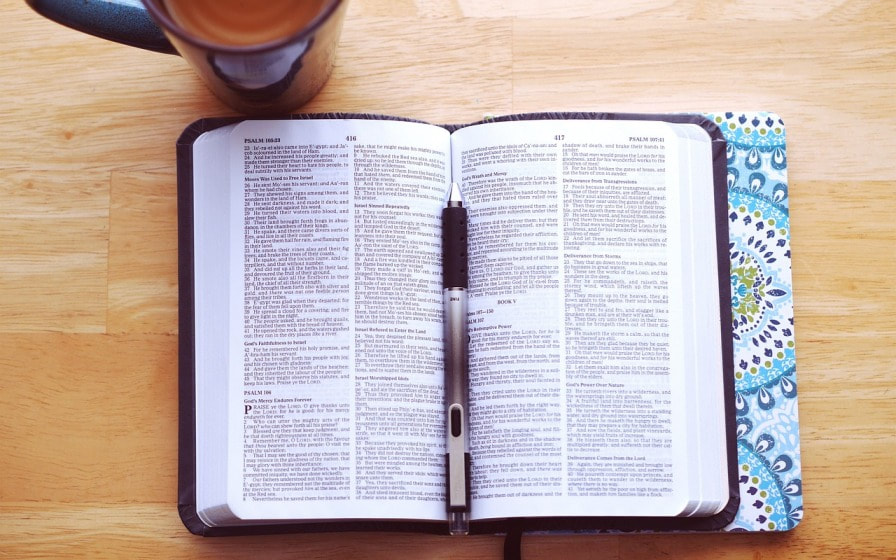|
There are things that are simply too great for me. They are too great for me to comprehend or control. The plans and purposes of God are mysterious – I simply cannot wrap my head around them. Things happen in the providence of God – I cannot change them. I may wish to understand or strive to control, but ultimately I have to confess that I am just too small. Thankfully, I am not alone.
David had a similar struggle. There were many things that David did not understand and could not control. So what did David do? He relaxed, or more accurately: he rested in the Lord. Note what he says in Psalm 131: “O LORD, my heart is not lifted up; my eyes are not raised too high; I do not occupy myself with things too great and too marvelous for me. But I have calmed and quieted my soul, like a weaned child with its mother; like a weaned child is my soul within me. O Israel, hope in the LORD from this time forth and forevermore.” The Psalm starts with David humbling himself before the Lord. Lifting up your heart or raising your eyes signified pride (v. 1). Instead of overestimating his own abilities, David did “not occupy myself with things to great and too marvelous for me.” This does not mean that David did not wrestle with the Lord or that he was indifferent. David thought great thoughts about God and he did great things for God. But David knew his limits. He understood that some things were just beyond him: beyond his understanding and abilities. In those moments David did not become restless, anxious or frustrated. He “calmed and quieted” his soul (v. 2). How do we do that? He tells us in the final verse: “hope in the LORD” (v. 3). In those moments he rested in God, “like a weaned child with its mother” (v. 2). You don’t understand it all, but God does. You can’t do it all, but God can. What will you do when you are faced with “things too great for me”? Take David’s advice: “hope in the Lord”. Because of Christ, Pastor Pieter Congratulations. If you started the Read Scripture plan on the first of January, you’ve already read through Genesis and you are almost midway through Exodus. You’ve also read about a fifth of the Psalms. This might not seem like much, but you are well on your way to reading the Bible through from beginning to end.
But what if you’ve lost some ground? What if you’ve struggled to keep up with the reading plan? You are not alone. I started the reading plan on the first of January, but this last week I’ve struggled to finish the assigned reading for each day. I made a point of reading each day, but I struggled to finish every chapter for each day. After two days I was behind. So what do you do? Give up or catch up? You could abandon the plan altogether. To give up or catch up, that is the question. I’d like to encourage you to catch up. There are a few ways you could do that. The first would be to set aside some time on Sunday to complete the chapters you’ve missed. This is one of the best uses for a Sunday afternoon. A cup of coffee, a comfortable chair and the Word of God... turn it into an event, instead of a chore. Catching up does not necessarily mean that you have to read it all a single day. Another way to catch up is to increase the amount of chapters you read for a few days. Read two Psalms instead of one. Another way to do this would be to read in the morning and in the evening: take the first day’s reading in the morning and the second reading at night. Before you know it, you are back on track. A third suggestion would be to use your “idle” moments. Standing in line at the bank, waiting for the car to be washed or for your doctor’s appointment... use these moments to read God’s Word instead of grabbing the nearest magazine or newspaper. Obviously this is not ideal: you don’t have a quiet, uninterrupted time in God’s Word. This cannot replace our dedicated time with God. But when we’ve fallen behind and we don’t want to lose touch with our reading plan entirely, these moments can be used to claw our way back. When my plan becomes a tyrant Doesn’t this make me a slave to a reading plan? Your reading plan can feel like a tyrant sometimes. There are days when discipline feels like duty or drudgery. However, discipline turns duty into delight – just give it time. In 1 Cor. 9:27 the apostle Paul said: “But I discipline my body and keep it under control” (ESV). The term Paul used usually meant “to strike under the eye”. This is not gentle language. The NIV translates it as “I beat my body” and the NASB as “I buffet my body”. Paul wasn’t advocating violence against our bodies (that would contradict the rest of Scripture), but he was serious about keeping his body under control. Discipline is not always enjoyable, but it is necessary. Paul concludes the verse with these words: “lest after preaching to others I myself should be disqualified.” Discipline can feel tyrannical, but its purpose is not to torment. Like a dedicated trainer, discipline wants you to achieve your goals. What is the goal of our reading plan? We want to get to know God better. From duty to delight In 1960 Maxwell Maltz published a book in which he explained that habits take about 21 days to form.Every self-help book written since have focussed on this supposed magical number: 21 days. To be fair, Maltz did say that it took at least 21 days to form a new habit. There is no magical number. The reality is a little more complex than that. Subsequent studies have found that forming new habits differs from person to person, and sometimes from habit to habit. On average a person takes about 66 days or two months to form a new habit. In a study by Phillippa Lally of the University College London it was discovered that some people can form new habits in as little as 18 days, but most took much longer. Some took up to 254 days to form the new habit. What does this mean for our new habit of reading through the Bible? It means that Genesis and Exodus will be hard, Numbers and Leviticus may be a little harder, but somewhere between Deuteronomy and 1 Kings you’re discipline will start to pay off. Your new habit will have taken root. That new habit will not just benefit you for the rest of this year, but for the rest of your life as you seek to walk with God. 1 Timothy 4:7-8: “Rather train yourself for godliness; for while bodily training is of some value, godliness is of value in every way, as it holds promise for the present life and also for the life to come.” Because of Christ, Pastor Pieter Resolutions have been made – now is the time to keep them. By the grace of God and with the aid of the Holy Spirit we will read through the entire Bible together. Let’s get started.
Make Time As I mentioned on Sunday, the first step to ensuring that the Word of God is a daily part of your life, is to make time. Setting aside time for reading the Bible means that we order our lives in such a way that Bible reading happens. For some, this means setting aside a set time in the evening. For others, it means setting aside time in the morning, before the day starts running away with you. For moms it might mean reading while Junior takes his nap. Whatever your situation, look for a set time during the day where you have some measure of peace and quiet. If you can find such a time, make such a time. Get to bed 30 minutes earlier and get up 30 minutes earlier. Make time. Stick to the Plan The second step to ensuring that the Word of God is a daily part of your life, is to make a plan and stick to the plan. A reading plan helps you move through the Bible in a meaningful and orderly way. It takes us to passages we might choose to skip and prevents us from getting stuck on passages we prefer. Reading the whole Bible in a year gives you a great “bird’s eye view” of Scripture. It immerses you in the world and vocabulary of the Bible. There are a number of reading plans out there – you may even find one printed in the back of your Bible. This year I’m going to follow the Bible Project Reading plan. It takes you through the Old and New Testament in a more or less chronological way. It includes a Psalm for every day, which is not only great to read, but also great fuel for prayer. I’ve also chosen this plan because it includes a series of videos which introduces each book. There are also a few videos that cover important topics you’ll encounter, such as Atonement or Holiness. This helps bring your Bible reading to life in a way that keeps the plan interesting and keeps you motivated. You can use the “Read Scripture” app (available on IOS and Android). The videos can be watched in the app, on the Bible Project website (www.thebibleproject.com) or on Youtube. Meditate Once you’ve read the section of Scripture for the day, take a few minutes to consider these questions:
It helps to keep a diary, but it isn’t essential. One piece of advice with diaries: don’t try to write a commentary! A few lines, key words or verses that moved you should be enough. May the Lord bless you as you seek Him daily in his Word. Because of Christ, Pastor Pieter A new year has dawned and with it an opportunity for growth. Most of us commit to making some kind of change to our lifestyles and priorities. These often take the form New Year’s resolutions. However, most of these lofty ideals are quickly forgotten. But what would happen if we kept our resolutions? And what might happen if those resolutions focused on God instead of self?
In 1722 a young Jonathan Edwards needed direction. He was 18 at the time and was a long way from becoming the pastor and theologian we read about today. He decided to set down his goals in a series of ‘resolutions’. This is how he prefaced his resolutions: “Being sensible that I am unable to do anything without God’s help, I do humbly entreat him by his grace to enable me to keep these resolutions, so far as they are agreeable to his will, for Christ’s sake.” This reliance upon God and denial of self became the foundation for his resolutions and for his life. What were his resolutions? Here is his first: “Resolved, that I will do whatsoever I think to be most to God’s glory and to my own good, profit, and pleasure, in the whole of my duration, without any consideration of the time, whether now or never so many myriads of ages hence. Resolved to do whatever I think to be my duty, and most for the good and advantage of mankind in general. Resolved to do this, whatever difficulties I meet with, how ever so many and how ever so great.” The apostle Paul had similar resolutions. In Romans 15:20 he wrote: “I make it my ambition to preach the gospel”. Or in 2 Corinthians 5:9: “So whether we are at home or away, we make it our aim to please him.” Making and keeping these kinds of resolutions are what make men and women of God. What will your resolutions for 2019 be? Because of Christ, Pastor Pieter |
Topics
All
By Date
April 2024
|




